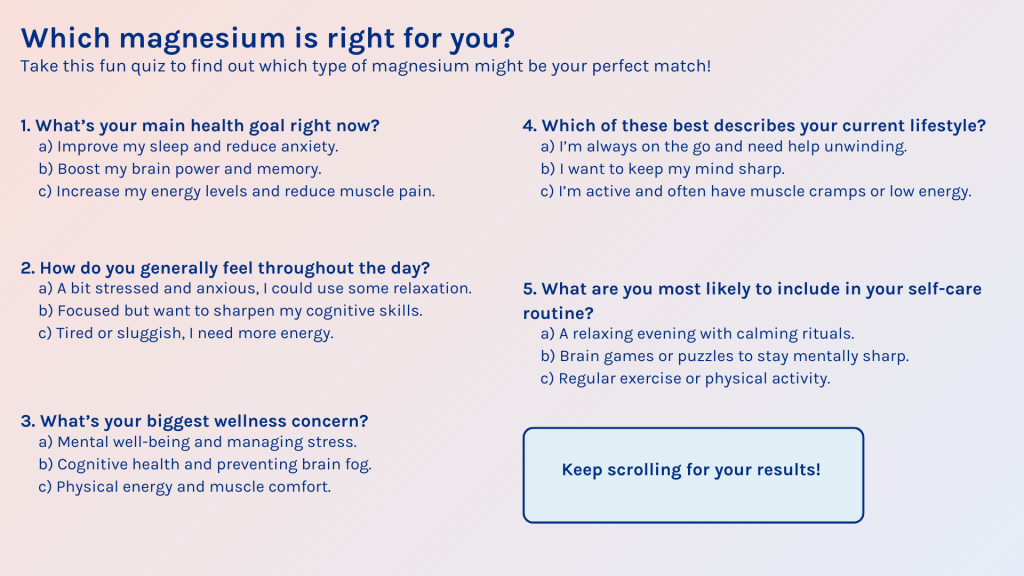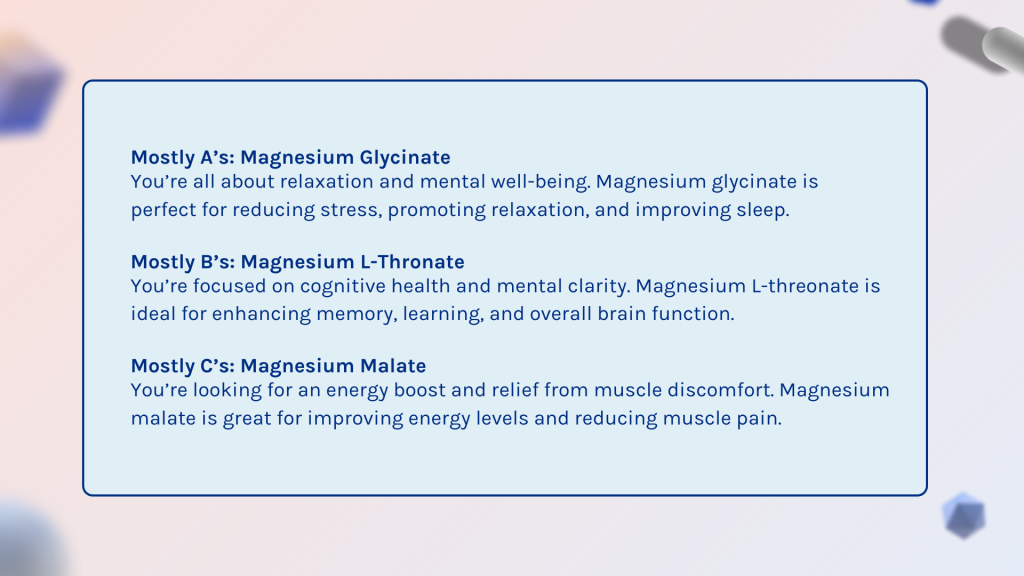Magnesium is a powerhouse mineral vital for over 300 biochemical reactions in the body, making it a go-to for overall health and well-being. It supports energy production, muscle and nerve function, and protein synthesis, while also playing a key role in maintaining normal blood pressure and heart rhythm. Magnesium is essential for bone health and helps regulate blood sugar levels, contributing to better metabolic health.
What Are the Different Types of Magnesium
Magnesium Glycinate: Magnesium glycinate is a highly bioavailable form of magnesium, meaning it’s efficiently absorbed and utilized by the body. This form is bound to the amino acid glycine, which has calming properties, making magnesium glycinate particularly effective for potentially reducing anxiety, promoting relaxation, and improving sleep quality. It’s also gentle on the stomach and may reduce the likelihood of gastrointestinal side effects like diarrhea, which are common with other forms of magnesium. Because of its calming effects, magnesium glycinate is often recommended for those looking to alleviate stress and improve overall mental well-being.
Magnesium L-Threonate: Magnesium L-threonate is a unique form of magnesium known for its ability to cross the blood-brain barrier, which makes it particularly beneficial for cognitive health. Studies suggest that magnesium L-threonate can enhance memory, learning, and overall brain function, making it a popular choice for those interested in supporting mental clarity and reducing the risk of age-related cognitive decline. Its neuroprotective properties may help improve mood and reduce symptoms of depression and anxiety. This form of magnesium is ideal for individuals looking to boost their cognitive performance and protect their brain health.
Magnesium Malate: Magnesium malate is a combination of magnesium and malic acid, which is naturally found in many fruits and is involved in the Krebs cycle, the energy-producing process in the body. This form of magnesium is known for its energizing properties, making it a great option for those dealing with fatigue or chronic pain conditions such as fibromyalgia. Magnesium malate can help improve muscle function and alleviate discomfort caused by muscle tension. Its role in energy production makes it an excellent choice for athletes or anyone needing a natural energy boost and enhanced physical performance.
Magnesium Citrate: Magnesium citrate is commonly used to support digestive health and relieve occasional constipation. This form is bound to citric acid, which enhances its solubility and absorption in the body. Magnesium citrate works as an osmotic laxative, drawing water into the intestines to promote regular bowel movements, making it an effective option for those experiencing constipation. In addition to its digestive benefits, magnesium citrate also supports muscle and nerve function, helping to reduce cramps and tension. Its ease of absorption and effectiveness in promoting regularity make it a popular choice for those seeking both digestive and general health support.
While we don’t offer magnesium citrate, we recognize its benefits, especially for its occasional use alongside other forms of magnesium for its laxative effect. If taking it alongside other forms of magnesium, we recommend considering the overall dosage to ensure you’re not exceeding the upper limit of 350mg.
Am I Getting Enough Magnesium?
Many people don’t get enough magnesium through diet alone, which can lead to a variety of symptoms including:
- Muscle cramps
- Fatigue
- Weakness
- Nausea
- Loss of appetite
- Irregular heartbeat
- Tremors
- Numbness or tingling
- Migraines
- Mood changes
- Difficulty sleeping
- High blood pressure
- Osteoporosis
Choosing the Right Magnesium for Your Needs

Fatigue & Sleep Concerns
For addressing fatigue and sleep concerns, Magnesium Glycinate is the best bet. The glycine component has calming properties that can help promote relaxation and improve sleep quality.
Muscle Cramps
For muscle cramps, Magnesium Malate is often recommended. This form is particularly effective for relieving muscle cramps, spasms, and overall muscle tension because it can help relax tight muscles and support proper muscle function.

Memory & Focus
For memory and focus, Magnesium L-Threonate is our go-to recommendation. As the only from of magnesium to cross the blood-brain barrier, it has the unique ability to directly influence brain health. It has been shown to enhance memory, learning and mental clarity. By increasing magnesium levels in the brain, it can also support synaptic connection, crucial for effective communication between neurons.
Digestive Support
Magnesium Citrate has osmotic laxative properties, which make it the preferred magnesium for digestive support. It works by drawing water into the intestines, which can help to soften stool and ease its passage. It’s a gentle, yet effective option for helping to improve digestive regularity.

Anxiety & Stress
Glycine, the amino acid bound to magnesium to form Magnesium Glycinate, acts as an inhibitory neurotransmitter in the central nervous system. It enhances the action of GABA, another neurotransmitter that has calming effects on the brain. By increasing GABAergic activity, Magnesium Glycinate can help reduce feelings of anxiety and promote relaxation.
Chronic Pain & Nerve Function
Magnesium Glycinate can help manage symptoms of conditions such as fibromyalgia and chronic pain by potentially reducing muscle cramps and tension, which are common in these conditions. It can support nerve health by improving magnesium levels in the body, which are crucial for proper nerve function and reducing symptoms like numbness or tingling.
Physical Performance & Energy Boosting
To help enhance physical performance and give an energy boost, Magnesium Malate is your top choice. It helps to reduce muscle soreness and fatigue by aiding in the efficient use of energy and reducing the buildup of lactic acid in muscles. This can be especially helpful for athletes or individuals involved in intense physical activities. Magnesium Malate also provides a more sustained energy boost, making it ideal for long-term use in supporting physical activity.

Not done exploring magnesium? Read more about its specific age related benefits and explore its role in migraine therapy.








